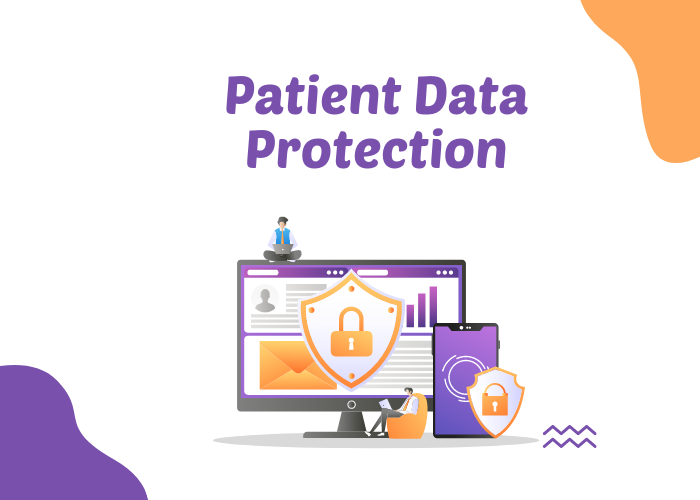
by editor | Aug 25, 2024 | Care Keys - Aides, Care Keys - Chaplains, Care Keys - Nurses, Care Keys - Social Workers, Rules and Regulations - Office Team, Rules and Regulations - Social Workers, Rules and Regulations - Volunteers
As a member of the hospice healthcare team, you play an important role in caring for your patients. Because of this, you will often learn private information about them – not just about their health, but also about their personal relationships, their financial situations, and other sensitive and personal information. It is important to understand that you have a legal and ethical responsibility to keep this information confidential and only share it – when necessary – with other healthcare professionals who are part of the patient’s care team. It is your responsibility to protect patient privacy.
Why is it important to keep healthcare information private?
In 1996, the Health Insurance Portability and Accountability Act (HIPAA) was passed to protect people’s health information. The main goal of HIPAA is to ensure that health information is kept private and secure, and only shared with those who need to know in order to provide care or process medical records. This law applies to everyone working in healthcare.
What does HIPAA protect?
HIPAA protects what is called “personal health information” (PHI). This includes any details that could identify a patient, such as:
- Name
- Medical record number
- Date of birth
- Address
- Email address
- Social security number
Only those directly involved in a patient’s care or those who handle billing or administrative tasks should have access to this information.
Your role as a member of the patient’s healthcare team
As a member of the patient’s healthcare team, it is important to follow HIPAA rules to protect your patient’s privacy. If you share a patient’s health information without permission, it can harm the patient and break the trust they have in you. Here are some important things to keep in mind:
- Do not share information unnecessarily: Never discuss a patient’s health with friends, family, or on social media. Only discuss patient care with other healthcare workers who are directly involved in that patient’s care.
- Keep conversations private: If you need to talk about a patient’s care with another healthcare worker, make sure you do so in a private place where others cannot overhear.
- Secure patient records: Whether you are handling paper records or using electronic systems, always ensure that patient information is stored securely.
Why following HIPAA is important
By following HIPAA regulations, you help protect your patient’s privacy, ensure their information is handled with respect, and build trust. Patients and their families rely on you to keep their personal information safe, and HIPAA provides the guidelines you need to do so.
What are the guidelines of not following HIPAA?
Hospices and their employees must protect patient information at all times. If HIPAA rules are not followed, it can lead to serious consequences including fines, penalties, and even imprisonment. This applies not just to the hospice itself but also to any vendors or contractors who work with patient information.
Final thoughts
Understanding and following HIPAA is an essential part of your job as a member of a patient’s healthcare team. By keeping patient information private, you help ensure their safety, comfort, and trust in the care they receive. Remember, protecting privacy is not just a legal requirement – it is a crucial part of providing compassionate and respectful care.
Where can you find more information

by editor | Aug 24, 2024 | Care Keys - Aides, Care Keys - Chaplains, Care Keys - Nurses, Care Keys - Social Workers
What are advanced directives?
Advanced directives give patients the ability to direct their medical care in advance. Advanced directives are legal documents that tell doctors and caregivers what a patient wants for their healthcare if the patient becomes too sick to speak or make decisions. Advanced directives explain what kind of medical care the patient would like to receive, or not receive, in different situations.
Advance directives can also name the person who should make medical decisions for the patient in the case that the patient is unable to make those decisions.
Who writes an advanced directive?
The patient, while they are still able to make decisions, will write the advanced directive. Sometimes a family member or a close friend will help the patient, but it is important that the patient’s wishes are clearly written down.
When are advanced directives used?
Advanced directives are used if the patient is too sick or injured to talk or to make decisions about their own care. For example, if a patient is unconscious or has a severe illness that makes it difficult for them to speak, doctors or caregivers will check the advanced directive to understand the patient’s preferences and to know what to do.
How should advanced directives be treated?
An advanced directive is a legal document and must be followed carefully. The following is some guidance for members of the patient’s care team, relating to the patient’s advanced directive:
- Know where it is: It is important for members of the patient care team to know if the patient has an advanced directive and to know where it is kept. This will help ensure that the patient’s wishes are followed, if the need arises.
- Respect the patient’s wishes: The advanced directive represents the patient’s voice when the patient cannot speak for himself or herself. It is important to follow what it says in the advanced directive.
- Communicate: If a member of the care team is not sure that they understand what is written in the advanced directive, they should speak with other members of the care team. Together, they can work to understand the advanced directives and ensure that the patient’s wishes are honored.
- Stay calm and supportive: This situation is often stressful. It is important that members of the care team remain calm and provide support to the patient and members of the family.
Where can you find out more

by editor | Aug 23, 2024 | Care Keys - Aides, Care Keys - Nurses, Clinical Compliance
As a hospice home health aide (HHA), you have an important job in taking care of patients. Part of your job is helping with medications, but it’s really important to know what you can and can’t do. The rules might change depending on the state you work in, because each state has its own guidelines. Knowing these rules helps you give the best care to your patients while staying safe and following the law.
Why Medications Are Important
Medications help patients feel better when taken the right way. Here are some things hospice aides should do:
- Remind Patients: Make sure patients take their medicine on time.
- Watch for Changes: Pay attention to how patients feel after taking their medicine.
- Report to a Nurse: If a patient feels sick or different after taking medicine, tell a nurse right away.
Doing these things helps keep the patient safe and healthy. Let’s look at these ideas more closely.
What You Need to Know About Medications
- Medication Adherence: It’s really important that patients take their medicine exactly as the doctor says. If they miss doses or take it wrong, their symptoms might get worse. You can help by reminding patients to take their medicine and making sure they take the right amount at the right time. But remember, what you can do to help might be limited by state rules.
- Recognizing Side Effects: You should know about the common side effects of the medicines your patients take. You don’t need to know everything, but be aware of signs like dizziness, sleepiness, or changes in behavior. If you notice something unusual, tell the nurse right away. State guidelines often say it’s your job to watch for and report these things.
- Understanding Medication Schedules: Some medicines need to be taken at certain times, with food, or on an empty stomach. You should know these basic rules so you can help patients stick to their schedule. But remember, you can’t change the schedule or the medicine—only a doctor or nurse can do that.
- Communication with the Healthcare Team: It’s really important to tell the healthcare team about any problems with taking medications, side effects, or new over-the-counter (OTC) medicines the patient might be using. State rules usually say you must keep clear and accurate notes about your observations.
What Can a Hospice Aide Do with Medications?
- Remind Patients: In most states, you can remind patients to take their medicine. This is really important, especially for patients who might forget or have a strict schedule. But remember, reminding isn’t the same as giving the medicine. Usually, you can’t put the medicine in the patient’s mouth or give them a shot unless you have special training and the state allows it.
- Help with Medication Setup: In some states, you might help patients by setting up a pillbox or organizing their medicine, but only under a nurse’s supervision. This helps make sure the patient takes the right dose at the right time. Remember, the patient or a licensed professional must give the medicine.
- Observe and Report: You spend a lot of time with the patient, so you might be the first to notice changes in how they feel. You should know which medicines the patient is taking so you can spot any side effects, missed doses, or other problems. Always report these to the nurse and write down what you observed, if your state allows it. Just remember, only write down what you see—don’t make any medical guesses.
What Can’t a Hospice Aide Do with Medications?
- You can’t give the medicine directly to the patient, like putting a pill in their mouth
- You can’t give shots or injections.
Your job is to help and remind patients about their medicine, not to give it directly.
Safety First!
- Follow the Rules: Every state has different rules about what you can do with medications. Some states let you help a little more, like setting up pillboxes, while others have stricter rules. Following these rules keeps everyone safe.
- Ask if You’re Not Sure: If you’re not sure about something with medications, always ask a nurse or follow your agency’s guidelines.
Where Can You Find Out More

by editor | Aug 19, 2024 | Care Keys - Aides, Care Keys - Nurses, Care Keys - Social Workers
When taking care of patients in hospice, it’s important to understand the difference between over-the-counter (OTC) and prescription medications. Knowing how these medications work and what they’re used for can help you provide better care.
What Are Over-the-Counter Medications?
Over-the-counter (OTC) medications are medicines you can buy without a doctor’s prescription. These include things like pain relievers (like Tylenol or Advil), cold medicines, and allergy pills. People use OTC medications for common health problems like headaches, colds, or minor aches and pains. These medicines are generally safe when used as directed on the label. But it’s still important to be careful, especially when patients are taking other medications.
What Are Prescription Medications?
Prescription medications are medicines that a doctor or other healthcare provider must prescribe. These drugs are often stronger than OTC medicines and are used to treat more serious health conditions. Because they are stronger, they can have more side effects or cause harm if not taken exactly as prescribed. Patients in hospice care often take prescription medications to manage pain, control symptoms, or treat chronic conditions.
Key Differences Between OTC and Prescription Medications
- Access: You can buy OTC medications at a store without a prescription, but you need a doctor’s order to get prescription medications.
- Strength: Prescription medications are usually stronger and meant for more serious conditions.
- Safety: Both types of medications are safe when used correctly, but prescription medications require more careful monitoring because of their strength and potential side effects.
What Hospice Aides Need to Know About Medications
- Never Give Medications Without Approval: Always follow the care plan and never give a patient any medication, including OTC, without approval from a nurse or doctor.
- Be Aware of Interactions: Some OTC medications can interact with prescription drugs and cause problems. For example, taking aspirin (an OTC pain reliever) with certain prescription blood thinners can increase the risk of bleeding.
- Watch for Side Effects: Both OTC and prescription medications can have side effects. Be alert for any changes in the patient’s condition, and report anything unusual to the nurse or healthcare provider.
- Follow State Guidelines: Each state has specific rules about what hospice aides can and cannot do when it comes to assisting with medications. In some states, aides may help with medication reminders, but they should not give medications directly. Always follow the guidelines in your state and the care plan for each patient.
Where Can You Find Out More
- FDA: Understanding Over the Counter Medication
- Mayo Clinic: Prescription Drug Information

by editor | Aug 14, 2024 | Compliance and Regulatory - Directors, Human Resources, Payroll
As a manager in hospice care, your role goes beyond overseeing patient care and managing staff. It includes ensuring that your team feels valued and fairly compensated. Pay transparency is becoming a hot topic, and understanding its implications can help you effectively navigate this evolving landscape.
What Is Pay Transparency?
Pay transparency refers to the practice of openly sharing information about compensation within an organization. This can include posting salary ranges in job listings, discussing pay openly among employees, or providing detailed breakdowns of how pay is determined. The goal is to ensure that employees understand how their pay is calculated and that there are no disparities based on gender, race, or other factors.
What is the status of pay transparency regulations in the U.S.?
The U.S. is starting to experience a trend in adoption of pay transparency regulations. Several states have introduced laws that require employers to provide salary ranges in job postings or upon request. For example:
- Colorado: The state’s Equal Pay for Equal Work Act requires employers to include salary ranges in job postings and provide pay information to employees upon request.
- New York City: The city requires employers with four or more employees to include salary ranges in job advertisements.
- California: As of January 2023, California employers with 15 or more employees must include pay scales in job postings.
It is likely that more states will follow and that the laws with transparency requirements will continue to be more comprehensive.
Why Is Pay Transparency Important?
- Fosters Trust and Engagement: When employees understand how their pay is determined and believe it is fair, they are more likely to feel valued and engaged in their work. In a field as emotionally demanding as hospice care, high employee engagement is crucial for maintaining a positive work environment and delivering high-quality care.
- Reduces Pay Disparities: Pay transparency helps to identify and address pay disparities that may exist within your organization. In healthcare, where women and minorities are often overrepresented in lower-paying roles, transparency can be a tool for promoting equity and ensuring that all employees are paid fairly for their work.
- Compliance with Regulations: Some states in the U.S. are implementing laws that require employers to provide pay ranges in job postings or share salary information upon request. Staying ahead of these regulations by adopting pay transparency practices can help your hospice avoid legal challenges and demonstrate a commitment to fairness.
How to Implement Pay Transparency
- Review Current Pay Practices: Start by conducting a thorough review of your current pay practices. Ensure that salaries are consistent with market rates and that there are no unexplained disparities among employees with similar roles and experience levels.
- Communicate Clearly: If you decide to move towards more transparency, communicate clearly with your team about what information will be shared and why. For example, explain how pay ranges are determined and what factors influence individual salaries.
- Train Managers: Provide training for all managers to ensure they understand the principles of pay transparency and are equipped to have open and honest conversations about pay with their team members.
- Update Job Postings: If your state requires it or if you choose to do so, include salary ranges in job postings. This not only meets regulatory requirements but also attracts candidates who appreciate transparency and fairness.
- Regularly Review and Adjust: Pay transparency is not a one-time effort. Regularly review your compensation practices and make adjustments as needed to ensure ongoing fairness and compliance with any new laws or guidelines.
Challenges of Pay Transparency
- Managing Expectations: One of the challenges of pay transparency is managing employee expectations. If employees see that their pay is lower than a colleague’s, they may feel undervalued, even if there are legitimate reasons for the difference. It’s important to be prepared to explain these differences clearly and fairly.
- Confidentiality Concerns: In some cases, employees may prefer to keep their salaries private. It’s important to balance transparency with respect for individual preferences and privacy.
- Complexity in Pay Structures: Healthcare organizations often have complex pay structures with various factors influencing salaries, such as certifications, years of experience, and additional responsibilities. Transparency requires clear communication about these complexities, which can be challenging.
The Future of Pay Transparency in the U.S.
It is likely that the U.S. will continue to see increased pressure for transparency in the coming years. The healthcare industry, including hospice care, may need to adapt to more stringent regulations and expectations around pay disclosure.
As a manager, staying informed about these trends and proactively implementing transparent pay practices can position your hospice to lead in this area. Not only will this help in complying with potential future regulations, but it will also foster a more equitable and supportive work environment for your team.
Conclusion
Pay transparency is an important and evolving issue. Adopting transparent pay practices now can help foster trust, promote fairness, and ensure compliance with current and future regulations. By being proactive in this area, you can create a more equitable and positive work environment for your team, ultimately leading to better care for your patients.
Where Can You Find Out More
- Gallagher: How managers can respond to pay transparency
- SHRM: How Companies can Respond to New Pay Transparency Laws
- Payscale: How to implement pay transparency
- World at Work: Pay Transparency – Risk, Rewards, and Regulations
- Harvard Business Review: Complicated Effects of Pay Transparency





